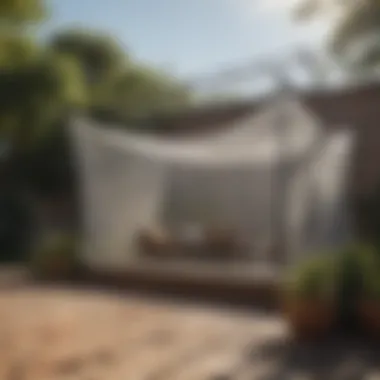Effective Strategies to Keep Mosquitoes Away from Your Home


Preventive Pest Control Strategies
Housewives are often looking for effective strategies to keep mosquitoes away from their homes. Implementing preventive pest control measures is crucial in maintaining a peaceful living environment free from pesky insects.
House Exterior Protection
Tips for sealing cracks: One essential aspect of house exterior protection is sealing cracks and crevices where pests can enter. By carefully inspecting and sealing any gaps, you can prevent mosquitoes from finding their way inside.
Clearing debris: Another vital step is clearing debris such as leaf piles and stagnant water which act as breeding grounds for mosquitoes. Keeping the exterior of the house clean and free from clutter is key to deterring these insects.
Preventing pests from entering: Installing screens on windows and doors, and sealing any openings around utility lines and pipes, can effectively prevent pests, including mosquitoes, from entering the house.
Yard Maintenance
Essential yard care routines: Regular yard maintenance such as mowing the lawn, trimming shrubs, and removing standing water from flower pots helps eliminate mosquito breeding sites.
Methods for keeping yard pest-free: Implementing natural pest control methods like planting mosquito-repelling plants such as citronella and lavender can deter mosquitoes from infesting your yard.
Indoor Cleanliness
Expert cleaning tips and techniques: Regularly cleaning and decluttering the indoors, especially areas prone to moisture like kitchens and bathrooms, can help eliminate mosquito habitats.
Maintaining a pest-resistant indoor environment: Using pest-resistant materials for furnishings, and organizing indoor spaces in a way that reduces potential hiding spots for mosquitoes can significantly contribute to a pest-free home.
Garbage Disposal
Efficient waste disposal methods: Proper garbage disposal practices such as sealing trash bags securely and keeping garbage cans tightly closed can help prevent attracting pests like mosquitoes.
Importance of proper garbage disposal: Ensuring that all garbage, especially food waste, is disposed of properly reduces the likelihood of pests invading your home.
Other Pest Prevention Strategies
Innovative ways to safeguard your home: Exploring alternative pest prevention strategies like installing ultrasonic pest repellents or utilizing flytraps can offer additional protection against mosquitoes and other pests.
Understanding Mosquito Behavior
In the realm of pest control, understanding mosquito behavior is a fundamental aspect that can make a significant difference in effectively warding off these pesky insects from your home. By comprehending the habits and tendencies of mosquitoes, you can strategically implement targeted measures to deter them successfully. This section serves as a crucial foundation in your quest to create a mosquito-free living environment, offering insights that will empower you to combat these unwelcome guests proactively.


Identifying Mosquito Habits
Areas Mosquitoes Breed
One of the key aspects of understanding mosquito habits is identifying the specific areas where mosquitoes breed. Mosquitoes tend to lay their eggs in stagnant water, such as ponds, birdbaths, and even accumulated rainwater in outdoor containers. These breeding grounds provide an ideal environment for mosquito larvae to thrive, perpetuating the cycle of these pests in your surroundings. By targeting and eliminating these breeding sites, you can disrupt the mosquito life cycle and reduce their population significantly, making it a pivotal strategy in your mosquito control efforts.
Times of Day They Are Most Active
Another crucial element to grasp in understanding mosquito behavior is the times of day when they are most active. Mosquitoes are typically more active during dawn and dusk when the environmental conditions are favorable for their movement and feeding. Being aware of these peak activity periods allows you to schedule outdoor activities accordingly, minimizing your exposure to mosquitoes and the risk of bites. By adapting your routines to avoid these peak hours, you can lessen the chances of encountering mosquitoes and protect yourself effectively.
Factors Attracting Mosquitoes
Standing Water
Standing water acts as a magnet for mosquitoes due to its role as a prime breeding site for these insects. Mosquitoes lay their eggs in still water, leading to the rapid development of larvae and the perpetuation of the mosquito population. By addressing areas with stagnant water and removing potential breeding grounds, you can significantly reduce the attractiveness of your surroundings to mosquitoes, making it an essential step in mitigating their presence around your home.
Body Heat and Sweat
In addition to stagnant water, mosquitoes are also drawn to body heat and sweat emitted by humans. These insects are attracted to the carbon dioxide exhaled during respiration, as well as the scent of sweat and body odors. Understanding that your body's heat and perspiration can serve as beacons for mosquitoes underscores the importance of taking preventive measures like using repellents and covering exposed skin to reduce their attraction. By minimizing factors that appeal to mosquitoes, you can diminish the likelihood of being targeted by these bothersome pests effectively.
Natural Repellents and Plants
In the battle against mosquitoes, natural repellents and plants play a crucial role in keeping these pesky insects at bay. Natural solutions not only offer an eco-friendly approach but also provide effective protection for your home and family. By incorporating essential oils and mosquito-repellent plants into your surroundings, you create a hostile environment for mosquitoes while enhancing the overall ambiance of your living space.
Essential Oils as Repellents
Lavender Oil
Lavender oil stands out as a potent mosquito repellent due to its pleasant aroma and natural insect-repelling properties. Its calming fragrance not only deters mosquitoes but also adds a soothing atmosphere to your home. The key characteristic of lavender oil lies in its dual functionality of repelling insects while promoting relaxation. This multi-functional aspect makes it a popular choice for households seeking a natural and fragrant mosquito deterrent. Despite its effectiveness, some may find the floral scent overpowering, which could be a potential downside for those sensitive to strong fragrances.
Citronella Oil
Citronella oil is renowned for its exceptional mosquito-repelling abilities, making it a staple choice in the battle against these insects. Its distinct citrusy scent effectively masks human odors, thus reducing the attraction of mosquitoes to individuals. The key characteristic of citronella oil is its strong odor that acts as a barrier, keeping mosquitoes at bay. This feature, along with its natural composition, makes it a preferred option for those looking for a potent yet natural mosquito repellent. However, its efficacy may vary depending on factors like concentration and application, which could be considered as potential limitations.
Mosquito-Repellent Plants
Mosquito-repellent plants like lemon balm and marigolds offer a green alternative to chemical repellents, blending functionality with aesthetic appeal in your outdoor space. These botanical options not only fend off mosquitoes but also add beauty and balance to your garden or patio. Lemon balm's key characteristic lies in its lemony aroma, which naturally repels insects while imparting a fresh fragrance to the surroundings. Its rapid growth and low maintenance make it a popular choice for households seeking an easy-to-care-for mosquito deterrent. On the other hand, marigolds boast brightly colored blooms that not only adorn your garden but also contain compounds that mosquitoes find repulsive. The unique feature of marigolds lies in their ability to repel a variety of insects, making them a versatile and visually appealing option for natural pest control. While both lemon balm and marigolds offer numerous advantages, it's essential to note that individual sensitivities to plant scents may vary, potentially affecting their suitability for some individuals.


Maintaining Your Outdoor Space
In this crucial section about maintaining your outdoor space to keep mosquitoes at bay, we delve into the significance of proactive measures to ensure a mosquito-free environment around your home. Consistent outdoor maintenance plays a vital role in reducing mosquito breeding grounds and their presence, offering you a serene and enjoyable outdoor living space. By focusing on specific elements like yard upkeep and landscaping, you can effectively minimize mosquito populations and create a more comfortable outdoor setting.
Effective Yard Maintenance
When it comes to effective yard maintenance, regularly mowing the lawn is a key aspect that significantly contributes to mosquito control. The act of regularly mowing the lawn helps to eliminate tall grass and overgrown vegetation, which are ideal mosquito breeding sites. This practice not only improves the aesthetics of your outdoor area but also reduces the areas where mosquitoes can hide and breed. The systematic trimming of grass and vegetation enhances visibility and makes it easier to identify and address potential mosquito habitats, thus serving as a proactive step in mosquito prevention.
Moreover, regularly mowing the lawn is a popular choice for mosquito control because it is a non-toxic and environmentally friendly approach. Unlike chemical-based solutions, maintaining a well-groomed lawn is a natural and sustainable method to deter mosquitoes. This method is advantageous as it promotes overall lawn health and discourages mosquitoes from lingering in your outdoor space, offering both aesthetic appeal and functionality in mosquito management.
On the other hand, clearing stagnant water is another crucial aspect of yard maintenance that significantly contributes to mosquito prevention. Stagnant water serves as a prime breeding site for mosquitoes, providing an ideal environment for their reproduction. By promptly identifying and eliminating sources of stagnant water, such as bird baths, clogged gutters, or water containers, you disrupt the mosquito breeding cycle and mitigate their population growth.
This practice highlights the unique feature of clearing stagnant water as a preventive measure against mosquitoes, emphasizing the importance of removing standing water to reduce the likelihood of mosquito infestations. While mosquitoes require water for breeding, depriving them of stagnant water sources limits their reproductive potential and helps in controlling their numbers around your home.
Strategic Landscaping
In the realm of strategic landscaping, planting mosquito-repelling shrubs emerges as a distinctive approach to mosquito control. By incorporating plants like citronella, lavender, or marigolds that possess natural repellent properties, you create a barrier against mosquitoes in your outdoor space. These shrubs not only add beauty and greenery to your landscape but also serve a dual purpose of warding off mosquitoes naturally.
The key characteristic of planting mosquito-repelling shrubs lies in their ability to emit scents or compounds that mosquitoes find repellent, acting as a natural deterrent without the need for chemical sprays. This botanical defense mechanism makes such shrubs a popular choice for those seeking eco-friendly and sustainable mosquito control solutions. Additionally, the presence of mosquito-repelling shrubs contributes to the overall aesthetics of your outdoor environment, blending functionality with beauty in creating a pest-resistant landscape.
Conversely, using outdoor fans strategically in your outdoor space can also play a significant role in deterring mosquitoes. The key characteristic of this approach is the creation of airflow that disrupts the flight pattern of mosquitoes, making it difficult for them to land and feed. The gentle breeze generated by outdoor fans not only keeps you cool but also acts as a functional barrier against mosquitoes, reducing their presence near gathering areas.
The advantage of using outdoor fans as a mosquito deterrent lies in its non-invasive and environmentally friendly nature. Unlike chemical repellents, outdoor fans offer a continuous and mechanical solution to minimize mosquito disturbances, creating a comfortable outdoor setting without relying on harmful substances. However, one limitation of using fans is their dependence on electricity, which may not be feasible in all outdoor settings. Despite this drawback, the efficacy of outdoor fans in keeping mosquitoes at bay makes them a valuable component in your mosquito control strategy.
Practical Precautions Indoors
Practical precautions indoors play a crucial role in ensuring a mosquito-free living environment. Indoor spaces can serve as breeding grounds for mosquitoes, making it essential to take proactive measures to eliminate these pests. By implementing strategies to deter mosquitoes indoors, you can effectively reduce the risk of bites and potential diseases that these insects may transmit. In this section, we will delve into the significance of practical precautions indoors and explore specific elements, benefits, and considerations when it comes to safeguarding your home against mosquito infestation.
Installing Screens and Nets
Window screens
Window screens offer a vital line of defense against mosquitoes entering your home. Their finely woven mesh structure acts as a barrier, preventing mosquitoes from gaining access while still allowing ventilation. The key characteristic of window screens lies in their ability to provide protection without compromising airflow, making them a popular choice for maintaining indoor air quality while keeping pests at bay. Additionally, window screens are durable and cost-effective, offering a long-lasting solution to mosquito protection. However, ensure proper installation to avoid tears or gaps that mosquitoes could exploit.
Bed netting
Bed netting is a classic yet effective method for safeguarding your sleep area from mosquito intrusions. By suspending a net over your bed, you create a physical barrier that thwarts mosquitoes from reaching you while you rest. The key characteristic of bed netting is its simplicity and reliability in preventing nighttime mosquito bites. This proven method has been used for centuries and remains a beneficial choice for those seeking peaceful nights free from mosquito disturbances. However, ensure the net is securely tucked under the mattress to prevent mosquitoes from finding their way inside.


Eliminating Breeding Sites
Emptying water containers
Emptying water containers is a fundamental step in mosquito control indoors. Standing water serves as a prime breeding site for mosquitoes, making it imperative to eliminate these stagnant sources. The key characteristic of this task is its effectiveness in disrupting the mosquito life cycle by removing their reproduction habitats. Regularly inspect and empty containers such as flower pots, vases, and pet bowls to reduce the risk of mosquito larvae thriving. While this practice requires consistent effort, its advantages in reducing mosquito populations and potential disease transmission make it a worthwhile endeavor.
Cleaning gutters
Cleaning gutters is another essential measure to prevent indoor mosquito breeding. Clogged gutters can accumulate water, providing an ideal setting for mosquitoes to lay eggs and multiply. By clearing debris and ensuring proper drainage, you can eliminate potential breeding sites and reduce mosquito populations around your home. The key characteristic of gutter cleaning is its direct impact on reducing mosquito infestation by removing hidden water sources. Regular maintenance of gutters is crucial in preserving a mosquito-free indoor environment and enhancing overall sanitation.
Innovative Technological Solutions
In the realm of battling mosquito infestations, innovative technological solutions play a pivotal role in this comprehensive guide. These solutions offer advanced methods to tackle mosquito-related issues effectively. By incorporating cutting-edge technology, homeowners can address mosquito problems with precision and efficiency. The integration of innovative technological solutions ensures a proactive approach towards mosquito control, fostering a mosquito-free environment for individuals and families. Through the utilization of state-of-the-art devices and systems, such as mosquito traps and ultrasonic repellent devices, households can mitigate mosquito populations and enhance overall comfort.
Mosquito Traps
Mosquito traps are a key component of innovative technological solutions that aid in trapping and exterminating mosquitoes within the vicinity of the home. They are designed to attract mosquitoes through various means and subsequently trap them, reducing their presence significantly. Two popular types of mosquito traps are CO2 traps and electric bug zappers, each offering unique benefits in the battle against mosquitoes.
CO2 traps
CO2 traps are specifically engineered to lure mosquitoes using carbon dioxide, replicating the scent of human breath. This attractive feature entices mosquitoes towards the trap, where they are then captured and eliminated. The key characteristic of CO2 traps lies in their ability to mimic human breath effectively, making them a highly appealing choice for attracting mosquitoes. One of the primary advantages of CO2 traps is their efficiency in trapping mosquitoes, thereby reducing the mosquito population around the area of placement. However, a potential limitation of CO2 traps is their reliance on power sources for continuous operation, which may impact their effectiveness in areas with limited access to electricity.
Electric bug zappers
Electric bug zappers operate by attracting mosquitoes through UV light and electrocuting them upon contact with the device. The key characteristic of these zappers is their ability to eliminate mosquitoes instantly upon contact, providing immediate relief from these pests. Their effectiveness in swiftly dealing with mosquitoes makes electric bug zappers a popular choice for homeowners seeking quick and efficient solutions. Despite their efficacy in dealing with mosquitoes, electric bug zappers may also attract beneficial insects, potentially disrupting the natural balance of the environment.
Ultrasonic Repellent Devices
Ultrasonic repellent devices function by emitting ultrasonic waves that are unpleasant to mosquitoes, deterring them from staying in the area of coverage. These devices offer a non-invasive method of repelling mosquitoes without the need for chemical substances. They work by generating sound frequencies that are bothersome to mosquitoes, prompting them to avoid the protected area. While ultrasonic repellent devices are considered a convenient and environmentally friendly choice for mosquito control, they may have limitations in terms of coverage area and effectiveness against all mosquito species. Understanding the efficacy and limitations of ultrasonic repellent devices is crucial in determining their suitability for mosquito prevention strategies within the home.
Collaborative Community Efforts
Collaborative Community Efforts play a crucial role in the effective management of mosquito populations around your home. By collectively addressing mosquito breeding grounds and educating local residents, communities can significantly reduce mosquito-related issues. Collaborative efforts foster a sense of unity and responsibility among residents to tackle mosquito concerns collectively. Through shared knowledge and resources, neighborhoods can create a more sustainable and mosquito-free environment. By engaging in Community Efforts, individuals can take a proactive stance in mosquito control, contributing to a healthier and more enjoyable living space for everyone.
Community Drainage Maintenance
Clearing Clogged Drains
Clearing clogged drains is a key aspect of Community Drainage Maintenance that directly impacts mosquito breeding grounds. Standing water in clogged drains serves as a prime location for mosquitoes to lay their eggs, leading to an increase in the mosquito population. By clearing clogged drains regularly, communities can eliminate potential breeding sites for mosquitoes, reducing their numbers significantly. This proactive approach to drain maintenance is an effective and popular choice in combating mosquitoes, as it directly targets their reproduction cycle. While clearing clogged drains requires manual labor and regular upkeep, its benefits in reducing mosquito populations are invaluable, making it a vital component of mosquito control strategies.
Proper Waste Disposal
Proper waste disposal is another critical aspect of Community Drainage Maintenance that aids in mosquito control efforts. Accumulated waste can trap water, creating ideal conditions for mosquito breeding. By promoting proper waste disposal practices within the community, individuals can prevent the accumulation of stagnant water, ultimately reducing mosquito breeding sites. The key characteristic of proper waste disposal lies in its ability to disrupt the mosquito life cycle by eliminating potential breeding grounds. While emphasizing the importance of waste management, communities can significantly decrease mosquito populations and alleviate related nuisances. However, a potential disadvantage of proper waste disposal is the need for consistent community cooperation and awareness to maintain effective waste management practices.



